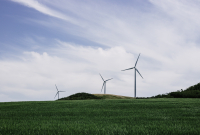Support strong Canadian climate journalism for 2025
Whataboutism.
Yes, that is a word, defined as “a reversal of accusation, arguing that an opponent is guilty of an offense just as egregious or worse.” The rhetorical device gained widespread use during the Cold War when the Soviet Union would respond to accusations of human rights atrocities by alleging the West was no better.
But we’re not here to talk about the Cold War. We’re here to talk about Canada, where whataboutism is creating a false equivalency between two climate plans that couldn’t be more different.
Here’s how the Globe and Mail’s John Ibbitson reviewed the Conservative’s plan: “When it comes to climate policy, the Liberals and Conservatives are mostly one and the same.” After summarizing a history of setting and missing climate change targets — by previous Conservative and Liberal governments alike — Ibbitson concludes, “When Mr. Trudeau became Prime Minister, he took meaningful action to reduce emissions, though the Parliamentary Budget Officer says they are insufficient on their own to meet the Paris goals. Now Mr. Scheer has a concrete, if probably insufficient, plan as well.”
Tweedledee and Tweedledum, he quips.
And Paul Wells, writing in Maclean’s: “I take Trudeau’s Liberals, today, to be more rhetoric than action on reducing carbon emissions, but a low bar is a low bar: if nothing else, they’re at least more ambitious on reducing emissions than Scheer’s Conservatives.”
Under Trudeau, Canada isn’t yet on track to hit our 2030 climate targets. Scheer claims, without substantiation, to offer Canada “the best chance” of hitting them (but won’t commit to hitting them). No real difference, some say.
But, hang on a second, really?
Neither of these columnists bothered to actually look at the track record of what the Liberals accomplished in office. If they had, they may have concluded — as Simon Fraser University economist Mark Jaccard did — that Canada has, under this government, emerged as a global leader and an example for climate action.
As Jaccard writes, the discrepancy between how global policy experts view Canada’s climate efforts and how they are perceived among environmentally concerned Canadians appears to arise from two key things: the government’s purchase of the Trans Mountain pipeline and its admission that Canada isn’t yet on track to achieve our 2030 emission reduction targets. But he also flags a third and critically important reason: most Canadians aren’t aware of all the federal government has done.
The Liberals deserve some blame for this: the bulk of their climate communication efforts focused on the carbon price and little else. You have to be pretty intrepid to stumble on Clean Canada, a synopsis of the government’s climate efforts.
To help fill this information gap, we at Clean Energy Canada have been writing a series of op-eds for the National Observer with a singular purpose: to talk about the many, many federal climate policies that now exist and that no one talks about.
We’ve written about the policies that support electric vehicles. We’ve written about the coal phaseout and other efforts to make Canada’s power grid 90 per cent non-emitting by 2030. We’ve written about the measures to improve energy efficiency and, in doing so, make us a less wasteful nation. We’ve written about the hugely important clean fuel standard and maintaining regulations for cleaner, more fuel efficient cars. All policies that rarely made the headlines and yet represent significant action beyond putting a price on carbon pollution.
The net effect of these efforts will be 434 million tonnes less carbon pollution in 2030 — taking Canada nearly three-quarters of the way to our 2030 Paris target. Meanwhile, modelling of the Conservative’s Real Plan finds that emissions will — wait for it — increase between now and 2030.
So, yes, at present neither plan will hit the target. But the Conservatives are hardly pretending to try, whereas the Liberals have built a foundation of climate policy in Canada unlike any we’ve had before. And they’ve signalled ambition to do more.
With climate change, every tonne of carbon pollution matters. The more we pollute, the more the earth warms, the worse things get. As Kate Marvel, a NASA climate scientist, neatly wrote, “Climate change isn’t a cliff we fall off, but a slope we slide down.”
Climate change may be the top issue this election, and that’s not to the credit of one party. For their part, the NDP and Greens have put forward ambitious plans that have helped spur a race to the top.
And while the Liberals did buy a pipeline when they were in government, we don’t think this fact (which we would agree was a mistake) should embolden casual disregard of the progress that has been made.
The Pan-Canadian Framework on Clean Growth and Climate Change was signed by the prime minister and premiers in December 2016, and over these past three years, the federal government has built the foundations for a clean energy future. Foundations upon which we can — and yes, must — do much more. Foundations upon which our clean energy sector, which already employs roughly 300,000 Canadians, will grow and thrive.
Because while that progress was slowly made, it could be quickly lost.
Here is what we ask: take an hour, click the links above, and read this series.
Consider what has been accomplished thus far, and examine the ideas on offer for how we can do more. Read all of the party platforms. And bear in mind that where there are foundations to build on, there is also the risk of a wrecking ball.
And then, on October 21, cast a ballot for continued climate action.





Comments
"Canada has, under this government, emerged as a global leader and an example for climate action."
This commentary should come with a warning to readers: DO NOT READ WHILE EATING OR FOR 3O MINUTES THEREAFTER. I almost choked on my cornflakes. Then I felt sick to my stomach.
Canada lags well behind other nations on climate action.
In the 2018 Climate Change Performance Index, Canada ranks 51st of 60 countries.
• germanwatch.org/en/CCPI
The Climate Action Tracker rates Canada's efforts as "highly insufficient".
• climateactiontracker.org/countries/canada/
Climate Transparency's 2018 report card for Canada underlines the absence of "ambitious renewable energy targets and policies."
"Canada produces more greenhouse gas emissions than any other G20 country, new report says" (Toronto Star, 2018)
On average, each Canadian produces 22 tonnes of GHG per year —the highest among all G20 members and nearly 3x the G20 average of 8 tonnes per person.
• www.thestar.com/news/canada/2018/11/14/canada-produces-most-greenhouse-…]
Trudeau adopted Harper's pathetic emissions targets — targets which he too has no intention of meeting.
When it comes to oilsands expansion, Trudeau, Notley, Scheer, and Kenney are all on the same page.
"Climate leader" Justin Trudeau: "No country would find 173 billion barrels of oil in the ground and just leave them there."
Trudeau is peddling an insidious, far more dangerous, form of denialism.
"The New Climate Denialism: Time for an Intervention" (The Narwhal, Sep 26, 2016)
• https://thenarwhal.ca/new-climate-denialism-time-intervention
Acknowledge the science, but ignore its implications. Boast about climate leadership, but push oilsands expansion and pipelines. Sign int'l agreements, but fail to live up to them.
Trudeau is betting that the world will fail to take real action on climate change. The only scenario in which oilsands expansion makes sense.
According to Trudeau, the path to renewable energy and a sustainable future runs through a massive spike in fossil-fuel combustion and emissions. Complete disconnect from the science.
Unfortunately, the Liberals are far more effective than the Conservatives in delivering on Big Oil's and Corporate Canada's agenda. Especially on energy projects.
Trudeau & Co. have persuaded many Canadians that we can both act on climate and double down on fossil fuels. Trudeau and Notley moved the ball on the Trans Mountain pipeline down to the ten-yard line. Their signal achievement was to "push country-wide support for pipelines from 40 per cent to 70 per cent." Something Harper, Scheer, and Kenney could never dream of doing.
Let's get real.
Notley and Trudeau signed on to Big Oil's fraudulent "climate" plan -- a deal forged by Big Oil and corporate Canada YEARS BEFORE Notley and Trudeau came to power.
Big Oil's climate plan permits oilsands expansion enabled by new export pipelines in return for a nominal carbon tax that would not impair their profits and a fraudulent oilsands cap. Window dressing.
Under the AB NDP's climate plan, the oilsands industry's grossly under-reported emissions would rise for decades, sabotaging Canada's climate action.
Trudeau & Big Oil are betting that the world will fail to take real climate action in time. They are betting on climate disaster. The only scenario in which oilsands expansion makes sense.
A plan to fail.
The sordid plot is detailed in Donald Gutstein's book, "The Big Stall: How Big Oil and Think Tanks are Blocking Action on Climate Change in Canada".
Gutstein details how neoliberal "progressive" politicians like Trudeau and Notley subverted the climate change agenda and enabled Big Oil's "predatory delay":
"The Rise and Fall of Trudeau’s ‘Grand Bargain’ on Climate" (The Tyee, 14 Nov 2018)
• https://thetyee.ca/Analysis/2018/11/14/Trudeau-Climate-Bargain/
"Justin Trudeau’s grand bargain with Big Oil exposed in Donald Gutstein's The Big Stall (The Georgia Straight, Nov 14th, 2018 )
• https://www.straight.com/news/1164161/justin-trudeaus-grand-bargain-big…
"'The Big Stall' details how neoliberal think tanks blocked action on climate change"
• rabble.ca/books/reviews/2019/04/big-stall-details-how-neoliberal-think-tanks-blocked-action-climate-change
The fire of climate change gets a few drops of water ... and ever more gallons per day of bitumen.
It seems to me the problem here has been over-focussing on consumers' efforts, and those of municipalities and provinces, while what needs to happen is putting a lid on the front end, where the stuff is produced ... not cheerleading at the back.
I won’t be impressed until I see legislation enacted that says there will be no new fossil-fuel infrastructure, and a winding down of existing fossil-fuel infrastructure.
As well, we should help other countries to build an energy infrastructure that does not use fossil fuels.